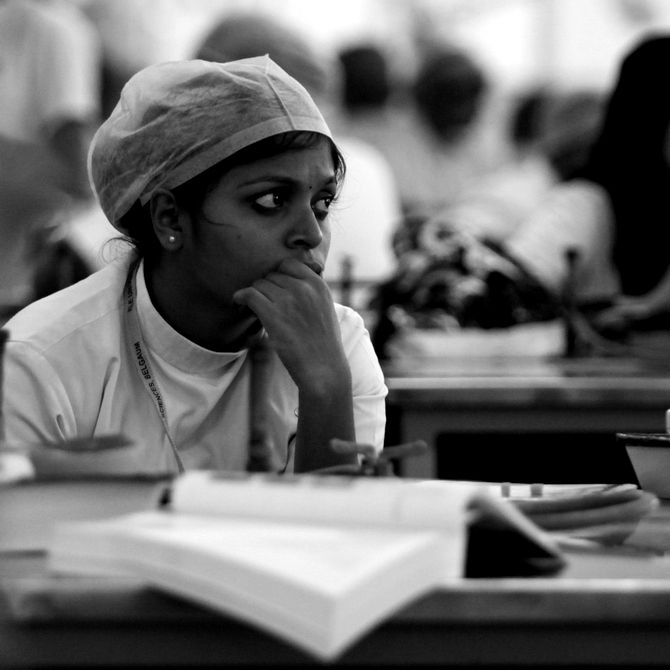 Rinki Roy Bhattacharya’s take on International Women’s Day.
Rinki Roy Bhattacharya’s take on International Women’s Day.
“The birth of a daughter was not a source of anxiety during the vedic period, in the post vedic phase, becomes a source of disaster to the father. Thus it was said the birth of a son is bliss incarnate, while the daughter is the root of family misery.”
Quoted from Dr Neera Desai & Dr Maitreyi Krishnaraj
It is no co incidence that Indian daughters develop low self-worth. Our language sayings abound in negative, anti-women, in fact, abusive proverbs particularly hostile to daughters. When girls are growing up, they hear negative sayings from the very family who ought to shower them with love and care.
Once the daughters become adults, other negative proverbs that address specifically to women, will haunt them. The commonest Indian proverb, I believe, is about the way we are asked to perceive daughters. Daughters, seen as paraya dhan, are believed to belong to someone else. Imagine how unloved and deeply disturbing this is for little girls to hear that they are no one in their home?
A similar sentiment is expressed in the Tamil saying that compares a girl child to a plant growing in the neighbour’s courtyard. Adding insult to injury is a particularly nasty Gujarati proverb, ‘Cows and girls go anywhere they are led’.
An even greater insult is the following Gujarati proverb: ‘Bairani buddhi paanie’ (a women’s intelligence is as high as the back of her feet)
With that kind of reasoning, women are debarred from decision making.
Parents in Bengal are advised against feeding girls well, or enough, highlighting the low status accorded to Indian daughters. The Bengali saying is brilliantly explicit in its cruelty ‘Girls grow up fast like banana trees, starve them’.
Ironically girls in West Bengal have a better chance of celebrating their first birthday than those born in Punjab even though the per capita income of a family in Punjab is twice that of a family in Bengal. Haryana and Assam have similar infant mortality rates.
It is strongly believed that once a daughter is married, only her dead body may return to her home. Such beliefs of course loudly confirms the ‘unwelcome-ness’ of daughters .Very few Indian languages say celebrate the birth of a daughter. It is said that a king will be pauper if he had daughters. Daughters are compared to a bundle of snakes on the head.
The Nepalese proverb: “Let it be late but let it be a son” succinctly announces male preference.
Revered Indian saint Tulsidas, advocated beating the drum, the Sudra and women. The Napoleonic code similarly advocated beating women, with the fond belief that the more you beat a donkey, a walnut tree and the wife, the better they are. In Victorian England beating a wife with a stick no thicker than the thumb was greatly approved and common practice. Known as the rule of thumb most English husbands enjoyed beating wives as their birthright. Men all over the world still believe it is a right acquired by marriage.
My Italian friend Roberto added to this clutch of gloomy sayings with one that enjoys immense popularity in his native culture: chi dice donna dice danno! (Mention women and invite disaster)
In Germany men are told, ‘suche deine Frau mit den Ohren -- nicht mit den Augen’ in other words, “look for a wife with your ears not with your eyes.” And German men want wives who “do not talk”. It has the same sub text that women and children are to be seen, not heard.
How have women survived these derogatory remarks? Do they have thick skin and shut their ears and eyes to the daily insults? Difficult questions to answer, but women have successfully survived these negative trends and are thriving brilliantly despite odds. Indeed they have found their place under the sun.
On the occasion of International Women’s Day I wanted to celebrate the occasion with positive language sayings that honour us women but found they are elusive and non-existent. In my hour of despair, an aunt tried to console by quoting an age old Bangla saying: “sangshar sukher hoi romonir gunee!”
Translated it reads: “It is a woman’s talent that renders the universe happy.” The aunt even praised motherhood with another traditional Bangla proverb: “kuputra jadiba hoi, kumataa kadapi noi” (sons may turn vile but never a mother).
The Manusmritis, that are notorious for their anti-women approach, have one redeeming quote however: It is said in the Smritis that Gods abandon a home where women are mistreated. The Marathi saying which translates as: “where women are happy, Gods reside” repeats that same sentiment.
These positive sayings are tokenisms against thousands of years of male dominance. As women reinvent themselves, make great strides in every field in every profession, beating their male counterparts hands down -- they have to rewrite the scriptures, rewrite their destiny, create history and write new narratives.
Otherwise they will be condemned to a life time of subjugation and slavery that have oppressed us all, not just women. For if half the world’s population is miserable, can the other half rejoice?
Janabai, the 12th century poet saint of Maharashtra, poignantly reminded us of women’s position with the couplet: “Let me not weep because I am born a woman. Many saints suffer thus”.
Image for representational purposes only. Photograph: Reuters










